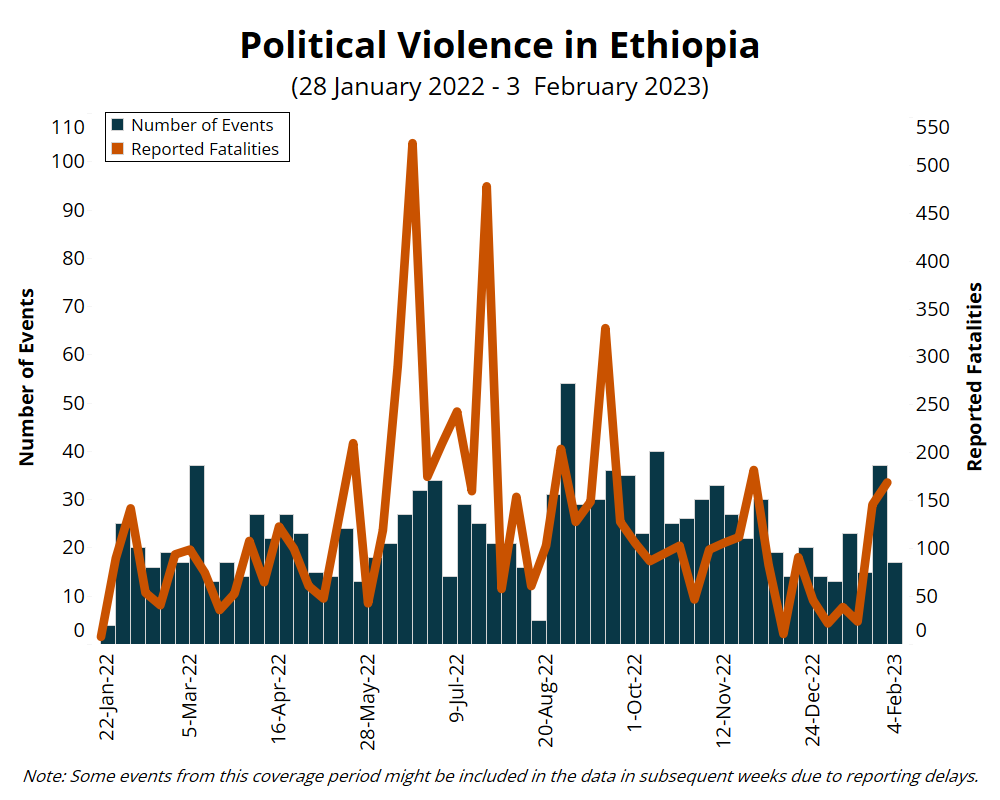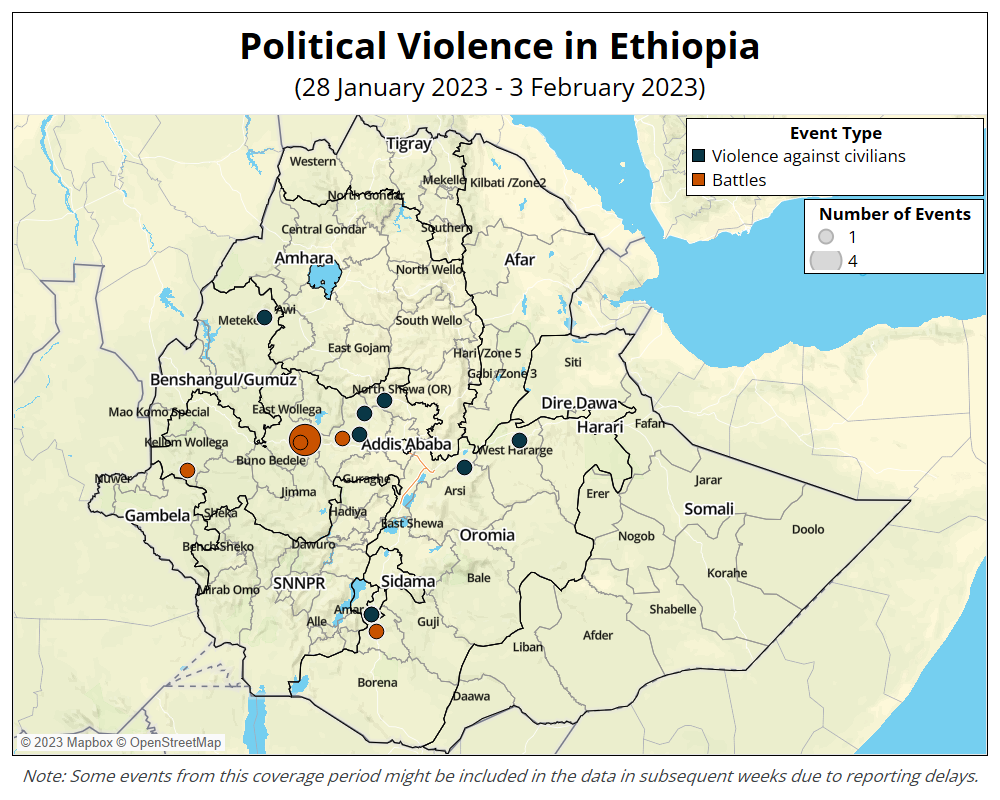By the Numbers: Ethiopia, 28 January 2022-3 February 2023
- Total number of political violence events: 1,253
- Total number of reported fatalities from political violence: 6,660
- Total number of reported fatalities from civilian targeting: 2,658
By the Numbers: Ethiopia, 28 January-3 February 20231Some events from this coverage period might be included in the data in subsequent weeks due to reporting delays.
- Total number of political violence events: 17
- Total number of reported fatalities from political violence: 169
- Total number of reported fatalities from civilian targeting: 16
Ethiopia data are available through a curated EPO data file as well as the main ACLED export tool.

Situation Summary
Oromia region continued to be one of the most volatile regions in the country. Last week, 10 armed clash events and six attack against civilian events were recorded in Oromia. The majority of the armed clash events were between the Oromo Liberation Front (OLF)-Shane and government forces – the Ethiopian National Defense Force, Oromia regional special forces, prison guards, and kebele militias – in Ano kebele and Sire town in East Wollega zone, Dembi Dolo town in Kellem Wollega zone, Dogo/Magada kebele and Gelana woreda in West Guji zone, and Goda Gelan/Bitile kebele and around Gibe river near Bako in West Shewa zone (see map below). It was also reported that last week, the OLF-Shane and an Oromo ethnic militia looted banks after killing four security guards in Gobu Seyo town in East Wollega zone.

The OLF-Shane, an unidentified armed group, and government forces were involved in violence against civilian events in Oromia last week. On 28 January, Oromia regional special forces allegedly shot and killed at least five civilians in Chiro town in West Hararge zone and Sinan Leku kebele in West Shewa zone after accusing them of having links with the OLF-Shane. Similarly, the same day, kebele militia members shot and killed two people in Guduru kebele in Abuna Ginde Beret woreda in West Shewa zone after accusing the victims of being OLF-Shane supporters. The OLF-Shane also reportedly attacked civilians last week. On 29 January, members of the OLF-Shane opened fire on a vehicle near a forest close to Torre area in Gelana woreda in West Guji zone, killing two civilians, including a pregnant woman, and injuring four other civilians. The vehicle was traveling from Burji special woreda to Dila town. A day later, on 30 January, presumed OLF-Shane members opened gunfire at Habish hotel where nine Chinese nationals were staying, killing one Chinese citizen and abducting one Ethiopian in Gebre Guracha town in Kuyu woreda in North Shewa zone.2Nigatu Regasa, Sheger FM 102.1 Radio, 1 February 2023 Lastly, on 1 February, an unidentified armed group attacked civilians in Golgota kebele in Merti woreda in Aris zone, killing an unspecified number of people and damaging property.
Violence also erupted last week in Oromia over a split in the Ethiopian Orthodox Tewahedo Church. Religious disputes within the Orthodox Church have expanded, and tension has increased in the country as the government has become involved. On 22 January, Abune Sawiros, archbishop of South West Shewa, along with two other archbishops, appointed 26 bishops in Haro Beale Wold Church in Woliso town in South West Shewa zone of Oromia and announced the establishment of an ‘all-inclusive holy synod’ without the knowledge of the Ethiopian Orthodox synod.3OBSTV, ‘The Tewahedo Orthodox Church leadership issues a statement,’ 22 January 2023 Abune Sawiros justified these appointments as necessary to resolve the long-lasting problems within the church as it has failed to serve believers in their native languages. He likewise accused the Ethiopian Orthodox synod of appointing the leadership from mostly “one group” and failing to be all-inclusive.4OBSTV, ‘The Tewahedo Orthodox Church leadership issues a statement,’ 22 January 2023 On the other hand, the Ethiopian Orthodox synod called the appointments to the all-inclusive high synod by Abune Sawiros “illegal” and excommunicated the three archbishops and 25 appointed bishops.5One of the bishops left the group led by Abune Sawiros and joined the Ethiopian Orthodox synod after submitting his apology to the Patriarch of the Ethiopian Orthodox Church; see EOTC TV, ‘Abba Tsegazeab Adugna asked for forgiveness,’ 25 January 2023 The synod declared that negotiating with the group led by Abune Sawiros “is indirectly breaking the laws and regulations of our church.”6EOTC TV, ‘The decision of the Holy Synod,’ 26 January 2023 The synod also asked the government to protect the church.
Last week, Prime Minister Abiy Ahmed stated that the problem should be resolved through dialogue. He reaffirmed that the government would not interfere in this dispute and asked his cabinet not to get involved.7Facebook @Abiy Ahmed Ali, 31 January 2023 However, the situation turned violent when security forces of Oromia region began arresting archbishops, bishops, and believers who supported the Ethiopian Orthodox synod’s decision to refuse to hand over control of the Orthodox churches in Oromia region to the all-inclusive high synod group. These actions further escalated the dispute, and the Ethiopian Orthodox synod and its believers accused the prime minister and the government of meddling in religious issues in violation of the constitution and supporting the other side that was “cast out” from the church.8EOTC Broadcasting Service Agency, ‘Press release by Holy Synod on the Prime Minister briefing,’ 1 February 2023 On 4 February, at least three people were killed when Oromia regional special forces attacked the Orthodox Church in Shashamene.9VOA, ‘Three Killed in Attacks on Ethiopian Orthodox Church, According to Report,’ 4 February 2023; This incident will be included in the data next week. Following this incident, the Ethiopian Orthodox synod called for peaceful demonstrations at churches at home and abroad on 12 February, following three days of fasting, praying, and wearing black starting from 6 February.10EOTC Broadcasting Service Agency, ‘A proclamation issued by the Holy Synod of the Ethiopian Orthodox Tewahedo Church,’ 4 February 2023 EPO researchers are following these developments closely.
Lastly, Prime Minister Abiy met with the Tigray People’s Liberation Front team of negotiators for the first time after the beginning of the northern Ethiopia conflict. During this meeting, they evaluated the implementation of the November 2022 peace agreement and identified issues, including remaining Eritrean troops in Tigray region, banking services, opening roads, budget, and establishing a transitional government in Tigray, that require further action.11Ethiopian Broadcasting Corporation, ‘Members of the federal government and TPLF negotiation team held a meeting with the presence of Prime Minister Abiy Ahmed for the first time,’ 3 February 2023; EBC, ‘Discussion of members of the federal government and TPLF negotiation committee,’ 4 February 2023; EBC, ‘Mr. Getachew Reda with EBC,’ 3 February 2023; EBC, ‘“The discussions on the peace agreement built trust” – Ambassador Redwan Hussien,’ 3 February 2023; BBC Amharic, ‘What did Mr. Getachew Reda said about their discussion with the Prime Minister?,’ 7 Feburary 2023 Consequently, the prime minister decided to increase flights to the capital of Tigray region, Mekele, and increase the capacity of the banking system.12Tweeter @Redwan Hussien, 3 February 2023 According to the prime minister’s National Security Advisor, Redwan Hussien, the national bank began sending 5 billion birr (93 million US dollars) to Mekele to be dispensed starting from 6 February, while Ethiopian Airlines increased its flights to Mekele from three to five times per week.13Tweeter @Redwan Hussien, 4 February 2023






